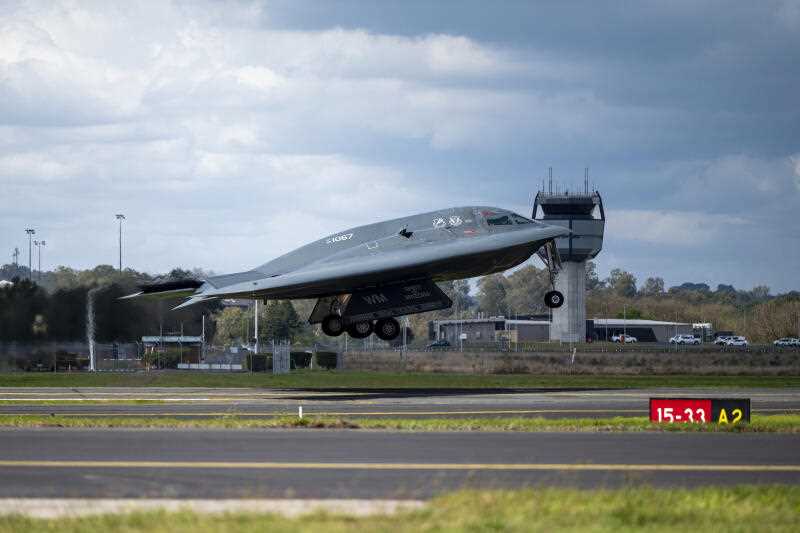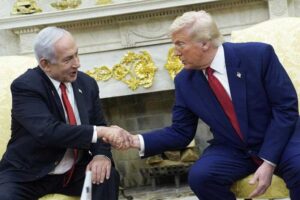Dave Milner
Why has Australia assisted in a US bombing mission to the Middle East?

Since an agreement in 2023 that would see B52s stationed at Tindal airbase at Katherine in the Northern Territory, a rapidly expanding military program has been rolled out, largely behind the public eye. While the government has pursued a paltry and lethargic domestic policy agendas across an entire term, the rapid reconfiguration of Australia’s strategic DNA couldn’t be happening any faster. Recent reports of US B-2 bombers using Australian assistance to attack targets in Yemen brings into focus the increased use of Australian assets to assist US military operations, and with it a set of questions about who authorises these missions, and more importantly, who denies them.
What still resembled a semi-independent strategic mindset when Malcolm Turnbull signed an agreement to procure French conventional submarines in 2016 evaporated when Morrison flipped everything on its head with the sudden introduction of AUKUS. When it became clear that Marles and Albanese were prepared to legislate Morrison’s opaque, vacuous, and trepidatious agreement without any due diligence or consultation, the strategic landscape of Australia changed dramatically. Just like that, a radical new chapter of Australia’s sovereign remit was scrawled on the back of a napkin by the flailing Morrison government, and codified blindly by the most vapid and unimpressive iteration of a federal Labor government in living memory.
Now, we won’t be getting submarines as a part of AUKUS, and we are told almost in half-jest by our AUKUS benefactors that the half a trillion dollars can be spent on non-submarine products in place of submarine products we truly need. The snake oil merchants have changed their nuclear submarine grift for a land-based missile defence grift to suit the occasion.
In the half-a-trillion dollar imprint left behind by the missing submarines, the press is left shuffling papers in an eerie silence, afraid to announce the fact that the submarines are missing, scared to admit that they lifted up these vapourware subs for three years straight, and are now too complicit to report on the biggest theft of taxpayer money in Australian history.
Clearly overwhelmed and under-knowledgeable, and ill equipped to handle the shifting sands that see our submarines and sovereignty swallowed up simultaneously, zealous senior Labor figures kept saying that the nuclear attack submarines (we are no longer getting), would not be used for launching nuclear ordinance. They reassured us that the US owned and operated B52 ‘Stratofortress’s’, designed for delivering nuclear payloads, would be delivering conventional payloads instead. We have no way of truly knowing. While ambiguity and opacity trickles down from Canberra, punters have been told of the construction of infrastructure purpose built to house foreign nuclear armed naval rotations in Western Australia on one day, or read of the expansion of a runway in the NT the next – then we abruptly hear our territory is being used to support the bombing of countries in the Middle East, and we start to wonder how we got here to begin with.
Australia has become embroiled in the frenetic program of US offensive operations in recent decades. Throughout the Global War on Terror and the endlessness of conflict, displacement and death in a 20 year period that stretched across the lands from Afghanistan to Libya, Australia has been involved at the coalface of US operations. Whether it be boots on the ground in the invasions of Afghanistan and Iraq, out of our element in vaguely missioned aerial bombing campaigns in Syria, or supplying weapons to the civil war in Yemen that resulted in an estimated 377,000 deaths, many of whom died from famine, Australia has been front and centre in US adventures abroad.
Entering the War on Terror under John Howard in the early 2000s changed our strategic posture overnight as we became less of a locally minded military force that was dedicated to engaging with the region behind a large diplomatic infrastructure, and more of a expeditionary force deployed on the other side of the world fighting asymmetrical wars at the behest of Washington. By the next decade under bipartisan PMs, Julia Gillard made a historically critical decision that allowed US troops to rotate in Darwin, Tony Abbott’s government further strengthened the ideology of the US alliance in Australian politics, and Turnbull announced that his government wanted to make Australia a top ten weapons exporter.
Only a short while later, we see AUKUS in fresh ink, and the newly minted Ambassador Kevin Rudd stands on the deck of the first US ship named after another country, the USS Canberra, looking pensively at an odd looking cutout of a star-and-striped kangaroo. The naming ceremony was supposed to be an honour; it looked like a sovereign handover.
While the government has been offering low ball neoliberal economic policies like cheaper child care approved by the Productivity Commission or a renovated version of Scomo’s Tax Cuts, it has been signing over access and fleet basing rights to foreign forces, providing cubicles and International Roast for US intelligence operatives at the Department of Defence, expanding barracks for foreign troops in the NT, and allowing the construction of secret bunkers that don’t need to ‘confirm or deny’ the presence of nuclear warheads.
The US has looked to fuse Australia to the circuitry of its military at a fundamental level, seeking to convert Australia from a sovereign state with its own unique set of interests, ideas and objectives, to a vassal like underling with a dependence on US military protection, a willingness to forgo its sovereign integrity, and a desire to do whatever is asked of it as a result.
Peter Cronau, editor of Declassified Australia, notes that Australian involvement in the latest B-2 missions provide insight “into the roles Australia will play in US long-range bombing missions should a conflict begin”, alluding to the bipartisan eagerness of Australian decisionmakers to work absolutely to the beck-and-call of Washington, even if that call is outside our region and inside a sovereign country.
Some would say that there is no problem in strengthening ties with our number one security guarantor in Washington, that critics don’t understand the limitations of Australia’s strategic choices, and the importance of a relationship to two Anglo-empires on the other side of the world. But without skilled leaders who possess an independent national thought process and a political consciousness that acts in the national interest, without a genuine and sincere fourth estate to identify the pitfalls, there is a precarity that comes with running blindly towards a superpower that is rotten from the inside out.
It’s not just that the last two bipartisan governments have altered our national reality so starkly, that they have worked together to throw half-a-trillion dollars of our money at a bunch of rapacious military consultants and former colleagues, that they both support Washington’s Israeli genocide, or that they clearly have no idea about what they are doing or seem to care. It’s that they are selling out our future for nothing in lieu of any good ideas. AUKUS lies in tatters as our sudden, overcomplicated and unnecessary entanglement with Washington leaves us with limited options moving forward. And it all seems so ridiculous and unnecessary and lazy.






